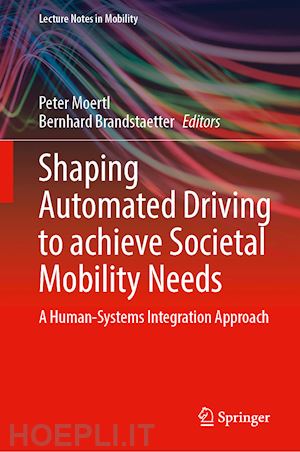

Questo prodotto usufruisce delle SPEDIZIONI GRATIS
selezionando l'opzione Corriere Veloce in fase di ordine.
Pagabile anche con Carta della cultura giovani e del merito, 18App Bonus Cultura e Carta del Docente
This edited book describes novel human-systems integration approaches to improve acceptance, safety, and comfort of automated vehicles. Each chapter analyses different aspects in the development of automated driving systems such as: assessing needs and opportunities of specific user populations i.e. elderly drivers and truck drivers; creating fluid human-systems interactions in the vehicle to answer specific driver needs; developing an automated driving tutoring application; and identifying benefits of including road infrastructure sensors to support automated driving predictability. A detailed description of the assessment of the above-described solutions in real-world situations is also included. Written by both researchers and professionals, this book offers timely and practice-oriented information concerning the development of automated driving systems that better adapt to the users’ needs.
Peter Mörtl is principal researcher for Human-Systems Integration at the Virtual Vehicle Research center in Graz, Austria. He is also lecturer of Human-Systems Integration at the University of Graz, Austria. The focus of his research is on developing socio-technical solutions that integrate humans and technical systems. For this, he is applying human factors and systems engineering methods. He is the coordinator of the EU H2020 project HADRIAN (Holistic Approach for DRiver role IntegrAtioN). Before working in the automotive domain, Peter Mörtl dealt with the topic of human-systems integration for aviation applications on the flight-deck and air traffic control. He received a master’s degree in systems engineering from the John Hopkins University in Maryland, US, and a PhD. in applied psychology from the University of Graz, Austria.
Bernhard Brandstätter is heading the department "Energy Management and Human Centric Systems" and the business unit "Efficiency and Comfort" at the Virtual Vehicle Research center in Graz, Austria, since 2014. He is also acquiring and coordinating several European projects. From 2002 to 2005, he was engaged in a major Austrian research project on automotive measurement. From 2005 to 2014, he served as Research Coordinator and CTO of Elin Motoren GmbH. He studied Electrical Engineering in Graz, Austria, and Genoa, Italy. He received his Ph.D. in Electrical Engineering and his Venia Docendi from Graz University of Technology in 1999 and 2003, respectively. He is the author or co-author of more than 100 scientific papers in the fields of optimization, numerics, electrical machines and inverse problems.











Il sito utilizza cookie ed altri strumenti di tracciamento che raccolgono informazioni dal dispositivo dell’utente. Oltre ai cookie tecnici ed analitici aggregati, strettamente necessari per il funzionamento di questo sito web, previo consenso dell’utente possono essere installati cookie di profilazione e marketing e cookie dei social media. Cliccando su “Accetto tutti i cookie” saranno attivate tutte le categorie di cookie. Per accettare solo deterninate categorie di cookie, cliccare invece su “Impostazioni cookie”. Chiudendo il banner o continuando a navigare saranno installati solo cookie tecnici. Per maggiori dettagli, consultare la Cookie Policy.